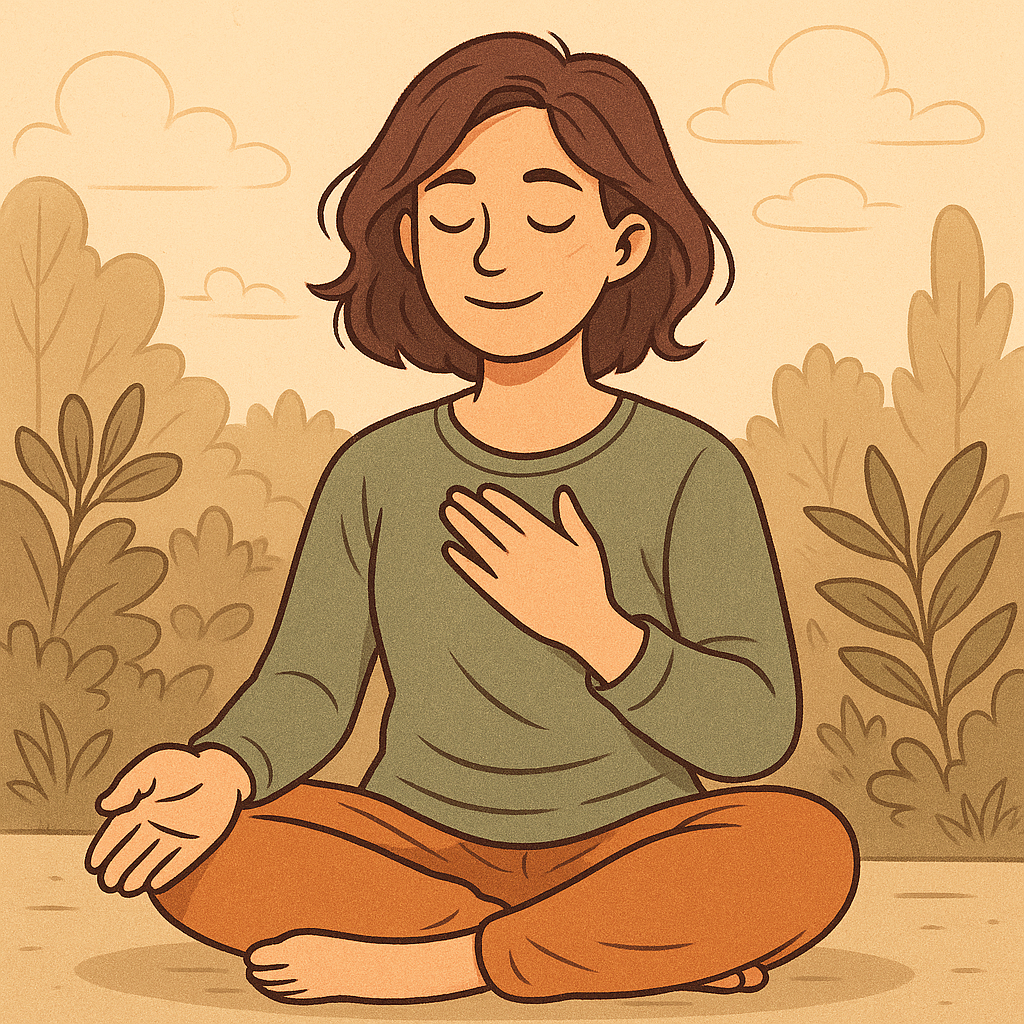While meditation is often praised for its ability to calm the mind and reduce stress, its power is multiplied when practiced with a compassionate inner attitude. Self-compassion turns meditation from a tool for productivity into a space for healing.
In this article, we’ll explore what self-compassion is, how it can support and enrich your meditation practice, and practical ways to cultivate both—together.
What Is Self-Compassion?
Psychologist Kristin Neff, a leading researcher in this field, defines self-compassion as extending the same kindness and understanding to ourselves that we would offer to a close friend. It consists of three main components:
- Self-Kindness – Being gentle and supportive with yourself instead of critical and harsh.
- Common Humanity – Recognizing that suffering is a universal human experience, not a personal failure.
- Mindfulness – Observing your experience without exaggeration or suppression.
Self-compassion doesn’t mean self-pity or self-indulgence. It’s about learning to relate to yourself with care, especially in moments of struggle.
How Meditation and Self-Compassion Work Together
Many people come to meditation looking for relief—from anxiety, overthinking, or emotional pain. But sometimes, meditation becomes yet another place where we judge ourselves: “I can’t focus,” “I’m doing it wrong,” “I’m not calm enough.”
This is where self-compassion changes everything.
When we bring a kind and accepting attitude to meditation, we stop fighting our experience and start relating to it with curiosity and softness. That shift allows for real healing and inner connection.
Benefits of combining meditation and self-compassion:
- Reduces inner criticism and shame
- Builds emotional resilience
- Supports mental health (especially in anxiety and depression)
- Enhances mindfulness by reducing resistance to discomfort
- Creates a safe inner space for difficult feelings to be held and processed
Self-Compassion in the Meditation Seat: What It Looks Like
Practicing self-compassion during meditation isn’t complicated, but it does require intentionality. Here are some ways it shows up:
- Adjusting your posture when you’re uncomfortable, without judging yourself for moving.
- Acknowledging distractions kindly (“It’s okay to be human”) rather than scolding yourself.
- Letting emotions arise without trying to fix or suppress them.
- Using gentle phrases like “This is hard, but I’m here for myself.”
- Ending sessions with gratitude instead of critique.
You can think of self-compassion as the tone of your inner voice during meditation. Is it curious or condemning? Encouraging or disappointed? With practice, you can shift it toward kindness.
Guided Meditations for Self-Compassion
If you’re new to this combination, guided meditations are a great place to begin. Look for practices labeled:
- Loving-kindness (Metta)
- Self-compassion break
- Soothing touch or heart meditations
- RAIN (Recognize, Allow, Investigate, Nurture)
Recommended sources:
- Kristin Neff’s website and meditations
- Insight Timer app
- Tara Brach’s website and podcast
- Calm and Headspace apps (search for \”compassion\”)
When Self-Compassion Feels Difficult
Many people struggle with self-compassion, especially if they grew up in environments where harshness or achievement was the norm. If you find it hard to be kind to yourself, you’re not alone.
Here are a few tips:
- Start small: Even saying “this is tough” with honesty is a step toward compassion.
- Imagine a friend: Ask yourself: What would I say to someone I care about in this situation?
- Use touch: Placing a hand on your heart or cheek can evoke a feeling of care, even when words fail.
- Write to yourself: A compassionate letter to yourself in a moment of struggle can help shift perspective.
Be patient. Like any skill, self-compassion takes time and repetition.
Integrating Self-Compassion Off the Cushion
The goal isn’t just to be kind while meditating—it’s to let that kindness ripple into the rest of your life. Self-compassion in daily life might look like:
- Taking breaks when you’re overwhelmed, without guilt.
- Speaking kindly to yourself after making a mistake.
- Setting boundaries that honor your well-being.
- Letting go of perfectionism.
- Celebrating small wins without waiting to be “better.”
Meditation is a training ground—but life is the real practice. Every stressful moment is a new opportunity to respond with softness instead of self-blame.
A Simple Practice to Try
Here’s a brief meditation you can try right now to integrate self-compassion:
- Find a comfortable position. Sit or lie down, close your eyes gently.
- Take 3 deep breaths. Let your body settle.
- Bring to mind a recent moment of difficulty. Something small but real.
- Acknowledge the feeling. Say inwardly: “This is painful” or “This is hard.”
- Remind yourself: “Struggle is part of being human.”
- Offer kindness: Use a phrase like “May I be kind to myself,” “I’m here for me,” or any words that feel sincere.
- Sit with that feeling. Even for just 60 seconds.
End with a deep breath and a gentle stretch. This simple practice helps break the habit of turning against yourself in hard moments.
Final Thoughts
Meditation without compassion can easily become just another self-improvement project. But when you bring a kind inner attitude to your practice, it becomes something much deeper—a way to come home to yourself.
Self-compassion is not a weakness. It’s a form of courage. It invites us to meet our imperfections not with judgment, but with presence.
So the next time you sit to meditate, remember: how you are with yourself matters just as much as what technique you use.
You’re not just practicing awareness—you’re practicing how to care.


Wow, your words struck me right in the face about self-criticism. I’ve had problems when attempting meditation and I know I am critical of myself. I’m going to look into guided meditation as you suggest.
Loving-kindness (Metta)
Self-compassion break
Soothing touch or heart meditations
RAIN (Recognize, Allow, Investigate, Nurture)
I’m going to do the simple mediation you suggest, too. Thanks for this post—I think it will help me overcome my anxiety when I meditate. – Shirley
Thanks Shirley, hope it helps. Let me know if you need some help 😉